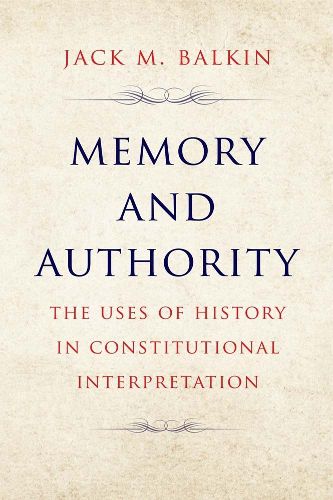Readings Newsletter
Become a Readings Member to make your shopping experience even easier.
Sign in or sign up for free!
You’re not far away from qualifying for FREE standard shipping within Australia
You’ve qualified for FREE standard shipping within Australia
The cart is loading…






From one of the nation's preeminent constitutional scholars, a sweeping rethinking of the uses of history in constitutional interpretation
Fights over history are at the heart of most important constitutional disputes in America. The Supreme Court's current embrace of originalism is only the most recent example of how lawyers and judges try to use history to establish authority for their positions. Jack M. Balkin argues that fights over constitutional interpretation are often fights over collective memory. Lawyers and judges construct-and erase-memory to lend authority to their present-day views; they make the past speak their values so they can then claim to follow it. The seemingly opposed camps of originalism and living constitutionalism are actually mirror images of a single phenomenon: how lawyers use history to adapt an ancient constitution to a constantly changing world.
Balkin shows how lawyers and judges channel history through standard forms of legal argument that shape how they use history and even what they see in history. He explains how lawyers and judges invoke history selectively to construct authority for their claims and undermine the authority of opposing views. And he elucidates the perpetual quarrel between historians and lawyers, showing how the two can best join issue in legal disputes. This book is a sweeping rethinking of the uses of history in constitutional interpretation.
$9.00 standard shipping within Australia
FREE standard shipping within Australia for orders over $100.00
Express & International shipping calculated at checkout
From one of the nation's preeminent constitutional scholars, a sweeping rethinking of the uses of history in constitutional interpretation
Fights over history are at the heart of most important constitutional disputes in America. The Supreme Court's current embrace of originalism is only the most recent example of how lawyers and judges try to use history to establish authority for their positions. Jack M. Balkin argues that fights over constitutional interpretation are often fights over collective memory. Lawyers and judges construct-and erase-memory to lend authority to their present-day views; they make the past speak their values so they can then claim to follow it. The seemingly opposed camps of originalism and living constitutionalism are actually mirror images of a single phenomenon: how lawyers use history to adapt an ancient constitution to a constantly changing world.
Balkin shows how lawyers and judges channel history through standard forms of legal argument that shape how they use history and even what they see in history. He explains how lawyers and judges invoke history selectively to construct authority for their claims and undermine the authority of opposing views. And he elucidates the perpetual quarrel between historians and lawyers, showing how the two can best join issue in legal disputes. This book is a sweeping rethinking of the uses of history in constitutional interpretation.